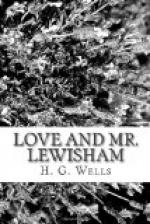Nearer she came and nearer, her eyes still downcast. He was full of vague, stupid promptings towards an uncalled-for intercourse. It was curious she did not see him. He began to expect almost painfully the moment when she would look up, though what there was to expect—! He thought of what she would see when she discovered him, and wondered where the tassel of his cap might be hanging—it sometimes occluded one eye. It was of course quite impossible to put up a hand and investigate. He was near trembling with excitement. His paces, acts which are usually automatic, became uncertain and difficult. One might have thought he had never passed a human being before. Still nearer, ten yards now, nine, eight. Would she go past without looking up?...
Then their eyes met.
She had hazel eyes, but Mr. Lewisham, being quite an amateur about eyes, could find no words for them. She looked demurely into his face. She seemed to find nothing there. She glanced away from him among the trees, and passed, and nothing remained in front of him but an empty avenue, a sunlit, green-shot void.
The incident was over.
From far away the soughing of the breeze swept towards him, and in a moment all the twigs about him were quivering and rustling and the boughs creaking with a gust of wind. It seemed to urge him away from her. The faded dead leaves that had once been green and young sprang up, raced one another, leapt, danced and pirouetted, and then something large struck him on the neck, stayed for a startling moment, and drove past him up the avenue.
Something vividly white! A sheet of paper—the sheet upon which she had been writing!
For what seemed a long time he did not grasp the situation. He glanced over his shoulder and understood suddenly. His awkwardness vanished. Horace in hand, he gave chase, and in ten paces had secured the fugitive document. He turned towards her, flushed with triumph, the quarry in his hand. He had as he picked it up seen what was written, but the situation dominated him for the instant. He made a stride towards her, and only then understood what he had seen. Lines of a measured length and capitals! Could it really be—? He stopped. He looked again, eyebrows rising. He held it before him, staring now quite frankly. It had been written with a stylographic pen. Thus it ran:—
“Come! Sharp’s the word.”
And then again,
“Come! Sharp’s the word.”
And then,
“Come! Sharp’s the word.”
“Come! Sharp’s the word.”
And so on all down the page, in a boyish hand uncommonly like Frobisher ii.’s.
Surely! “I say!” said Mr. Lewisham, struggling with, the new aspect and forgetting all his manners in his surprise.... He remembered giving the imposition quite well:—Frobisher ii. had repeated the exhortation just a little too loudly—had brought the thing upon himself. To find her doing this jarred oddly upon certain vague preconceptions he had formed of her. Somehow it seemed as if she had betrayed him. That of course was only for the instant.




